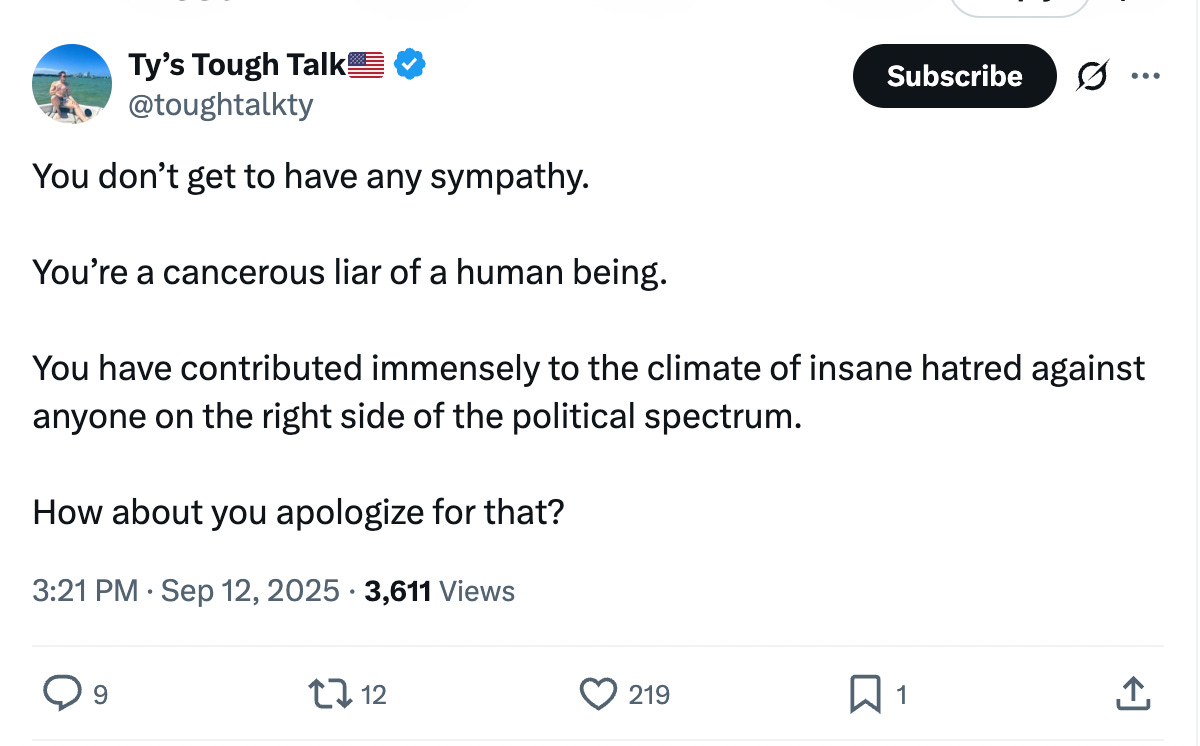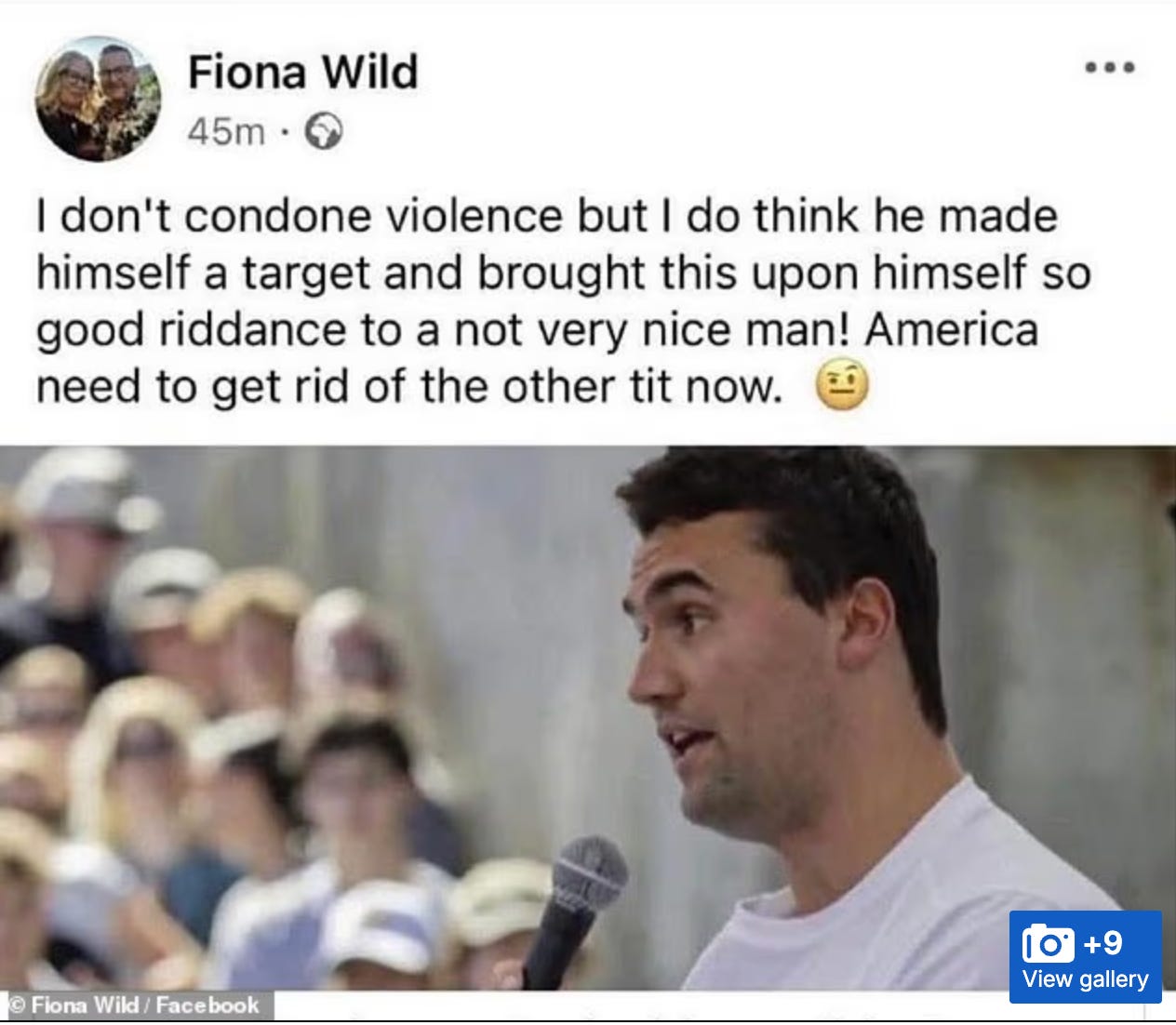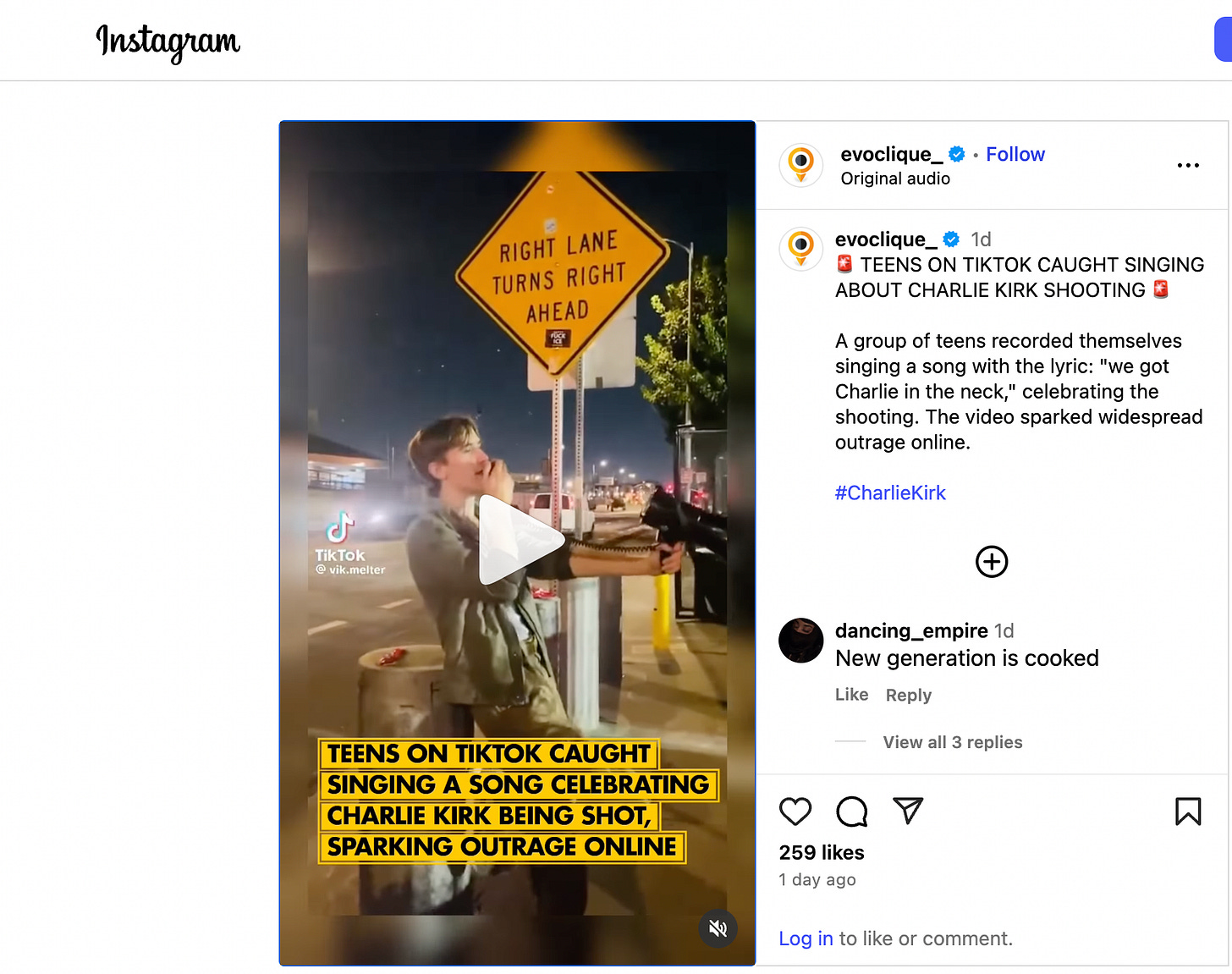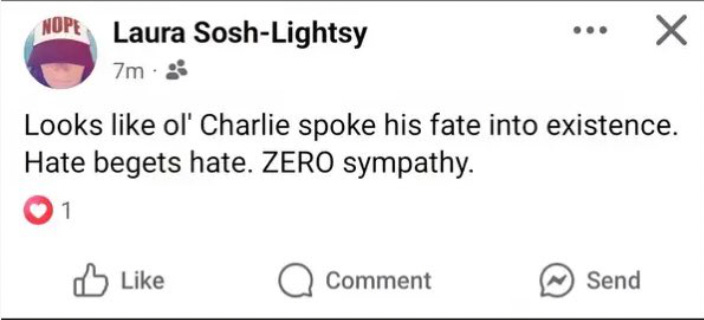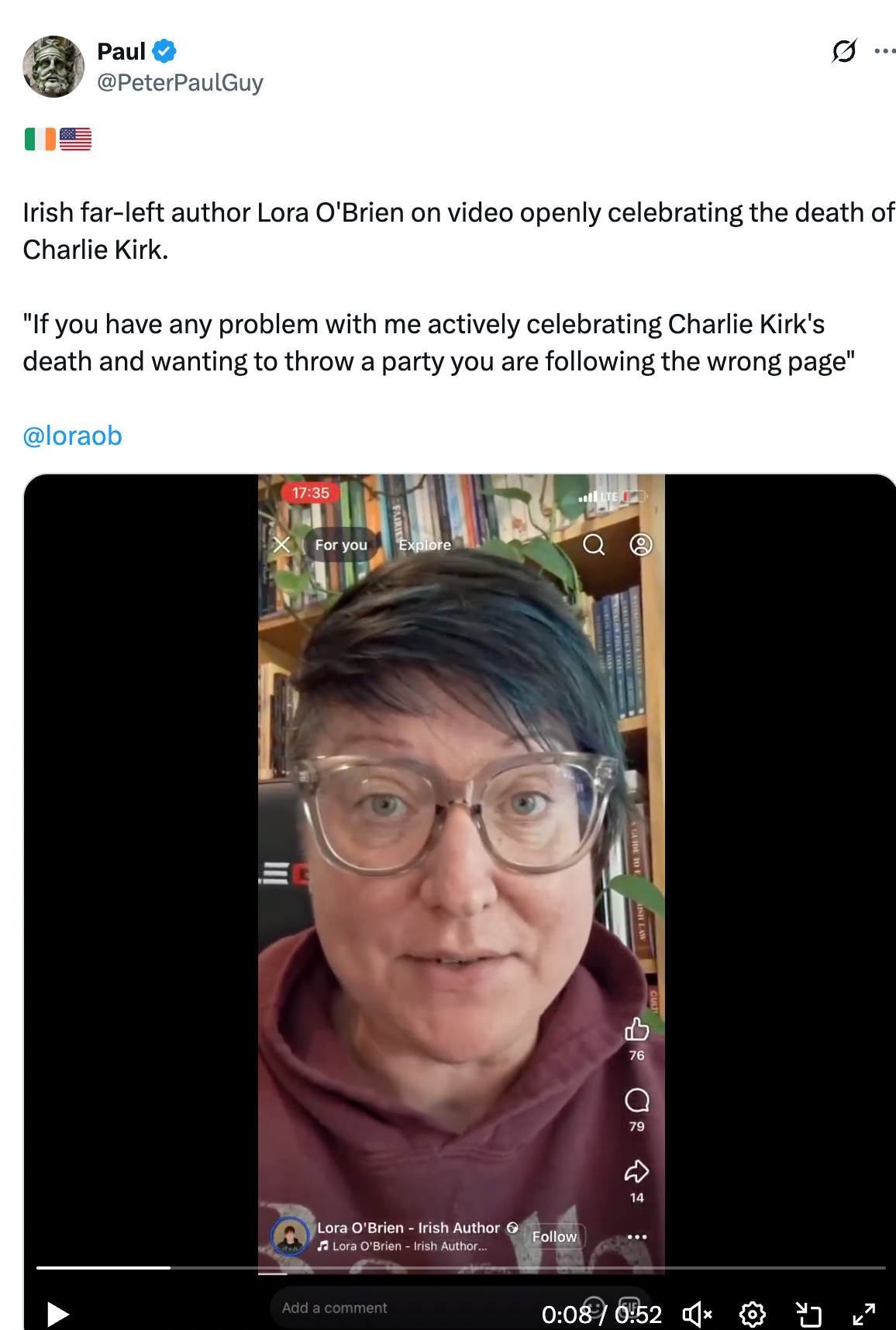I am still reeling on the inside after the cold-blooded assassination of conservative activist and commentator Charlie Kirk on the eve of September 11th. I did not know the man, and had hardly even heard of him before Wednesday. But my heart goes out to him and the family he left behind. Like me, he had a one-year old son and three-year-old daughter. Tragically, he was shot down in the prime of life for holding the “wrong” political beliefs, leaving behind a devastated wife and two tiny children, who will have to live with this for the rest of their lives.
My gut tells me that what just happened on the Utah Valley University campus is not only a momentous tragedy for Charlie’s wife and kids, but also a “before and after” moment for American democracy, and one that certainly cannot be ignored by other democratic nations in a globalised world. When a man is shot to death in cold blood in a country widely considered a bastion of free speech, for engaging in controversial debate, you know that something has gone badly wrong.
Much of the reaction to this tragedy has, predictably enough, been a blame game: was Kirk’s assassination somehow egged on by “hard-left” activists and commentators, or was it facilitated by the hardened rhetoric of Trump and his allies? We could go round and round pointing the finger at both sides, but it is is probably futile to try to lay the blame exclusively at the door of “the right” or “the left” for the troubling situation we are now in. This is an event that cuts through the right-left divide, raising burning questions about the resilience of American democracy, and arguably the resilience of the democratic West more generally.
So rather than attempting to lay the blame for political violence exclusively on one doorstep, let us recall a few simple truths: first, the “temperature” of political debate and attitudes in the United States and elsewhere has been rising in recent years, with increasing levels of hostility and dismissiveness on both sides - for example, when author Stephen King apologised on X for falsely maligning the reputation of Kirk immediately after his death, he was verbally excoriated and his apology, instead of being acknowledged as a good faith gesture, was dismissed by many as meaningless or insincere.
Second, while human vice infects all political movements to some degree, the turn to censorship, intimidation, intolerance, and “cancel culture” has been most noticeable in the Woke left that identifies with causes like abortion and transgender rights. Several years ago, I witnessed first-hand the obstructive tactics of a self-proclaimed “feminist” group in Oxford, who simply decided to shout down a guest speaker for daring to question the received wisdom among feminists about abortion. Leftist groups have sought to have academic professors fired for daring to have opinions at odds with their own; and it’s not often you hear leftists advancing a spirited defence of the right of their opponents to speak their mind without fearing legal censure or social death.
The third thing that most reasonable people should agree on is that both the Kirk assassination and the morally ambivalent reaction of some people to it, paint a disturbing picture of the state of American democracy today. The assassination was a radical expression of the idea that “they” (in this case, political and moral conservatives) are beyond the pale of American democracy, and have somehow forfeited the right to live among us. Such a proposition is a direct affront to the idea that we can openly air our political disagreements without putting our lives in danger.
The response to the assassination by some pundits on the left was especially disheartening. While they are representative of a particularly ugly and radical form of leftist politics, they have become sufficiently emboldened that they are not afraid to either minimize the moral weight of political violence, or in some cases, even celebrate it.
Lest you think I am exaggerating, here are a few posts from some of Kirk’s enemies on the left:
“I don’t condone violence but I do think he made himself a target and brought this upon himself so good riddance to a not very nice man. America need to get ride of the other tit now” (Fiona Wild, local political representative on Burnley Council in Lancashire, England - posted on Facebook)
“Hateful thoughts lead to hateful words, which then lead to hateful actions…You can’t stop with these sort of awful thoughts you have and then saying these awful words and then not expect awful actions to take place” (Matt Dowd, speaking on MSNBC).
A group of teens recorded themselves gleefully singing, “We got Charlie in the neck,” and the video appeared on Tiktok.
“Looks like ol’ Charlie spoke his fate into existence. Hate begets hate. ZERO sympathy.” - Laura Sosh-Lightsy, Assistant Dean of Students at Middle Tennessee State University (since fired).
“If you have any problem with me actively celebrating Charlie Kirk's death and wanting to throw a party you are following the wrong page" - Irish author Lora O’Brien, on her Facebook page. Video reproduced by @PeterPaulGuy on X.
I could go on. I have seen quite a few more videos on X from self-proclaimed leftists shamelessly celebrating Kirk’s violent death. Obviously, there are plenty of people on the left - undoubtedly, the vast majority - who would not celebrate what just occurred on the Utah Valley campus. But that is not the point. The point is, America today is a place where people feel no shame in celebrating a gruesome act of political violence, or suggesting the victim “had it coming” or brought this upon himself.
All of these problems are compounded by the ideology of “hate speech,” especially dear to many on the left. This idea is quite amorphous and hard to pin down, but it seems to boil down to something like the following: if you say something that suggest that some of my life choices are misguided, or suggest that my biological sex might have social or legal relevance irrespective of my gender identity, then you are “inciting hatred” against me. Come to think of it, if you say anything I strongly object to, I might claim you are “inciting hatred” against me or against this or that class of persons.
The next step, once “hate speech” is defined as a serious harm to other citizens, is to equate it with a form of “verbal violence” that is just a step away from physical violence. Once “offensive” or “hateful” speech is equated with violence, or viewed as a facilitator of violence, it is not too much of a stretch to suggest that the victims of such speech might have the right to defend themselves, as they would against a physical aggressor. The perpetrator of “hate speech” might be described as a “Nazi” or a “fascist” or some other extreme term. This dangerous and confused way of thinking lays out a path to political violence, which fanatics with pent-up anger and resentment will happily avail of.
What does this mean for the future of American democracy? Is it a wake-up call that will help America come to its senses and heal its wounds, or a “call to arms,” that will embolden more people on both sides to attempt to settle their political disagreements with bullets instead of words? History teaches us that violence generally begets more violence, but occasionally, it can also serve as a chastening reminder of what lies ahead if we continue down the spiral of dehumanising our political adversaries or treating them like second-class citizens. Nobody knows for sure which of these two paths America will take. But we can only hope the spiral of violence and hatred is broken very soon, before things go beyond the point of no return.
Thanks for reading! Find me on Twitter/X, Youtube, Rumble, and Telegram.
My academic profile and publications are listed at my newly re-vamped website, davidthunder.com.
Click here to download the preface and introduction to my book, The Polycentric Republic, for free.



